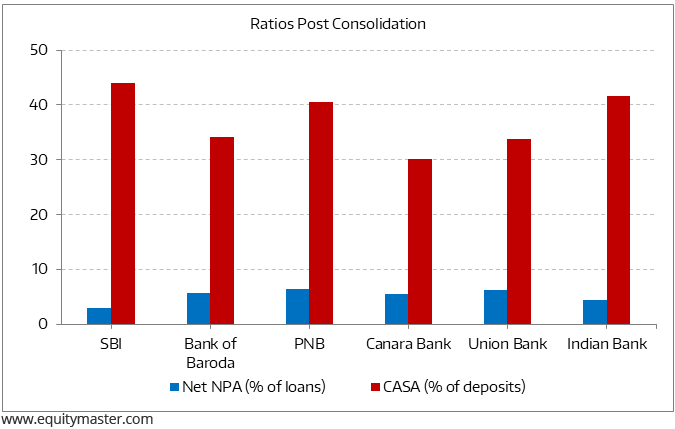Sensex Tanks 1,375 Points; Nifty Ends Below 8,300 Mark
Indian share markets witnessed selling pressure throughout the day and ended deep in the red with Sensex and Nifty witnessing a sharp fall during closing hours.
Benchmark indices dipped lower as the number of coronavirus cases in the country crossed 1,100-mark. Earlier, indices had pared some losses on report that there were no plans to extend the country-wide lockdown.
Barring FMCG sector and healthcare sector, all sectoral indices ended on a negative note, with stocks in the realty sector, finance sector and banking sector, leading the losses.
At the closing bell, the BSE Sensex stood lower by 1,375 points (down 4.6%) and the NSE Nifty closed down by 379 points (down 4.4%).
The BSE Mid Cap index and the BSE Small Cap index ended the day down by 2.1% and 1.8%, respectively.
Asian stock markets slipped as fears mounted that the global coronavirus shutdown could last for months. As of the most recent closing prices, the Hang Seng was down 1.5% and the Shanghai Composite stood lower by 0.9%.
Gold Prices are currently trading up by 0.4% at Rs 43,753.
The rupee is trading at 75.56 against the US$.
In news from the banking sector, the Reserve Bank of India (RBI) has decided to go ahead with the merger plan of ten state-run banks into four larger bank from April 1, even as the financial system is grappling with the impact of the coronavirus pandemic.
Last year, Finance Minister Nirmala Sitharaman had announced the merger of 10 state-run banks into four.
The central bank has issued four separate releases announcing that the branches of merging banks will operate as of the banks in which these have been amalgamated from next month.
Branches of Allahabad Bank will operate as branches of Indian Bank from April 1, branches of Andhra Bank and Corporation Bank will operate as branches of Union Bank of India, branches of Oriental Bank of Commerce and United Bank will function as branches of PNB and those of Syndicate Bank will operate as Canara Bank branches from April 1.
Depositors of these banks will be moved to the amalgamated entity. With this merger, India will have at least six big banks.
Last week, bank officers' unions wrote to the prime minister seeking to defer the merger schemes of lenders due to the lockdown triggered by coronavirus outbreak.
In a letter written to the Prime Minister on March 25, the All India Bank Officers'' Confederation (AIBOC) said, "the finance minister yesterday announced a slew of measures in view of the deleterious effect of the contagion. We are also expecting an extension of closing related activities and the revision of the closing date itself from March 31 to June 30, which is the need of the hour."
The Union Cabinet had approved the consolidation to build mega banks to create more efficient and bigger public sector banks in the challenging environment to meet the credit needs of a growing economy and to achieve operational efficiency by scale of business.
Last year, Bank of Baroda took over Vijaya Bank and Dena Bank. Before that, State Bank of India (SBI) had merged all its five associate banks with itself to enter the global top 50 banks' list in terms of size.
The amalgamation will lead to a wide geographical reach, technology adaption, and, more importantly, better utilization of scarce capital.
Speaking of PSBs, which banks look the best match post the latest matchmaking of PSU banks?
Needless to say, most investors would also be worried about the level of NPAs and current and savings accounts (CASA) of the merged entities.
Lower NPA ratio and sustenance of high CASA, in the future, could signal the banks' fitness levels to lend more.
But what could go unnoticed is the efficiency potential of the merged entities.
Post-merger, the employee per branch ratio of the consolidated PSU entities could be in the range of 7 to 9 per branch. This would be almost half that of their private sector counterparts like HDFC Bank and Kotak Bank.
India's Top 6 Public Sector Banks Are Getting Fitter

Leaner operations would mean use of technology to support growth.
So, we would not be surprised if the PSU entities leverage technology at a much bigger scale than their private sector peers, in a few years.
Moving on to news from the commodity space, crude oil prices dropped sharply today, with Brent hitting its lowest since November 2002, as the global coronavirus pandemic worsened and the Saudi Arabia-Russia price war showed no signs of easing.
US West Texas Intermediate (WTI) crude futures hit a low of US$ 19.92 in early trade, while Brent futures fell 5.6% to US$ 23.53 a barrel.
The record low US crude oil price in the last 18 years comes in the backdrop of the Donald Trump administration extending the social distancing guidelines.
Reports state that, this may put many shale oil producers out of business in the buildup to the US presidential elections in November.
An official from Saudi Arabia's energy ministry said on Friday the kingdom was not in talks with Russia to balance oil markets despite rising pressure from Washington to stop the rout that has cut prices by more than 60% this year.
As per reports, massive production cuts will be needed beyond just the Organization of Petroleum Exporting Countries (OPEC), with demand now forecast to plunge 15 or 20 million barrels per day.
Note that, crude oil prices had crashed earlier this month in what was the worst price dip since the 1991 Gulf War with Brent prices plunging to US$ 31 per barrel.
Disclosure: Equitymaster Agora Research Private Limited (Research Analyst) bearing Registration No. INH000000537 (hereinafter referred as 'Equitymaster') is an independent equity research ...
more


